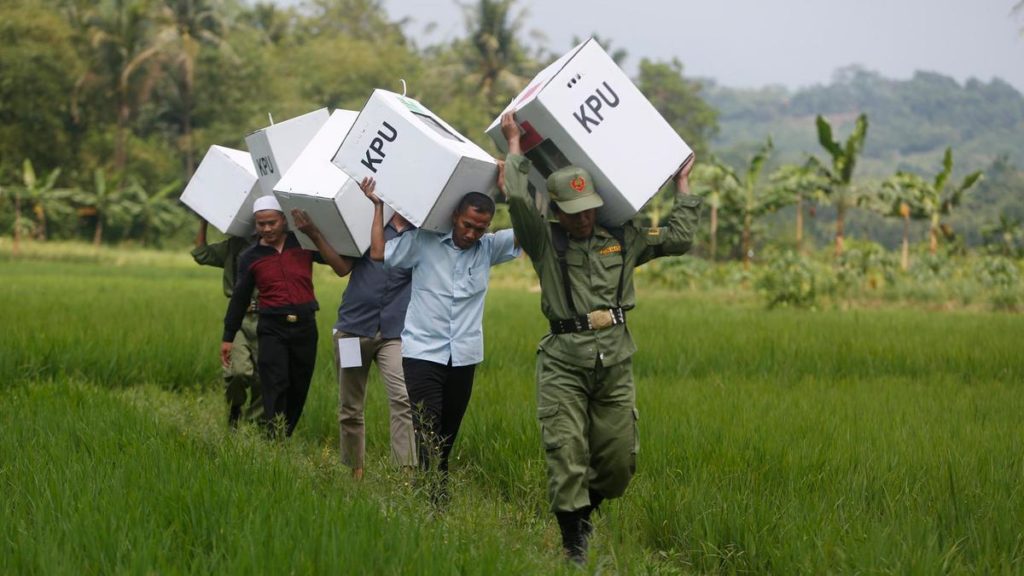From Israel to India and Indonesia, the season of divisive electoral politics will change – eventually

District employees carry ballot boxes through a field in Bogor, Indonesia, in preparation for general elections on April 17. Adi Weda / EPA
Negative political campaigns, filled with chauvinistic nationalism are the order of the day, but some countries have already proved that it doesn’t have to be this way
This is election month for the three I’s – Israel, India and Indonesia. Israel has finished voting and the incumbent prime minister Benjamin Netanyahu remains in charge, India started on April 11 and its seven-phase process will conclude on May 19, and Indonesia goes to the polls on Wednesday.
In Indonesia, anti-Chinese sentiment is playing into the election debate. It’s not just about Beijing’s influence and sizeable infrastructure projects, but the deep-seated economic resentment some Malay Indonesians bear towards wealthier Chinese Indonesians.
Prabowo Subianto, who is challenging President Joko Widodo for the top job, says that Mr Widodo has been too soft on China, a statement that has many layers of meaning and reveals his intention to be the election’s “Indonesia First” candidate. But Mr Widodo too has picked a controversial Muslim cleric as his running mate, one who wants to ban minority interpretations of the faith and, thereby, religious plurality.
In India, a complex cocktail of factors is at work – the othering of Muslim and Christian minorities, and fearmongering about national security. Meanwhile, Israel’s election was chiefly fought on issues revolving around national strength, filled with coded messages about further reducing the rights and status of ethnic Arab citizens.
So, are elections these days only won on a three-pronged agenda of nationalism, chauvinism and division?
Slovakia’s recent presidential election suggests not. Zuzana Caputova, a 45-year-old lawyer and civil society activist, ran – and won – on the promise to fight corruption and cronyism, and refused to engage in personal attacks on opponents, to disavow minority groups or cede her Christian values to illiberal political opinions. And on Sunday night, Finland’s Social Democratic Party, which has strong links to trade unions, narrowly won the nation’s general election on a hope-filled pledge to strengthen the welfare system. This means that Finland will have its first left-wing leader in 20 years.
But Slovakia and Finland stand out in a season of global political polarisation, of which Israel, India and Indonesia are good examples. Certainly, splitting the electorate and taking advantage of a divided opposition can pay off. Former Israeli foreign minister Shlomo Ben-Ami recently pointed out that Benjamin Netanyahu secured his right-wing coalition’s victory largely because the left and centre remained fractured and refused to form a united front with Arab Israelis. This, despite the relatively strong showing of the politically inexperienced Benny Gantz, who led his newly launched Blue and White party to a position of level pegging with Mr Netanyahu’s Likud.
Slovakia and Finland stand out in a season of global political polarisation, of which Israel, India and Indonesia are good examples
Then there is the exploitation of group animus. In its ongoing election, India presents one of the most grotesque examples of this trend. On April 11, the first day of polling, Amit Shah, president of the governing Bharatiya Janata Party threatened the removal from the country of “every single infiltrator… except Buddha (sic), Hindus and Sikhs”. Muslims and Christians, the groups Mr Shah failed to mention were, of course, the whole point of the comment.
On April 12, the BJP government minister Maneka Gandhi sparked further controversy by telling the Muslim community in her northern Indian constituency of Sultanpur that it must vote for her or settle for little help with jobs in the future. The BJP and its supporters have also been labelling critics and political rivals as “anti-national” and saying that they are in league with Pakistan. The main opposition Congress party has hit back at the BJP’s overall lack of “remorse in dividing our nation on communal lines”.
All of the above makes for a dismal snapshot of three important countries, recently or currently in election mode. Israel often styles itself as the Middle East’s only democracy, although that is increasingly in question when its laws privilege one group of citizens over another.
As for India and Indonesia, the scale of their democratic processes inspires awe. India has the world’s largest electorate; Indonesia, the third largest. Both run vast and geographically challenging elections, with varied means of transport employed to ensure voters in remote areas cast their ballots. Indian election officials and paraphernalia travel by foot, by road, special train, boat and sometimes, by camel and elephant. Indonesia – home of the world’s largest one-day elections – uses speedboats, wooden water taxis, planes and horses.
One might wonder about the point of these elaborate attempts to poll every eligible voter when some of the election choices are so socially divisive. But, as with everything, there are seasons in electoral politics, and those seasons change. A 2016 paper, “Elections and Divisiveness: Theory and Evidence” by the US academics Elliott Ash and Richard van Weelden and the Italian political scientist Massimo Morelli, noted that incumbent candidates spend more time on wedge issues than on “common values” that provide greater benefit to voters.
Though the study, for the UK’s Nottingham Interdisciplinary Centre for Economic and Political Research, focused on members of the US Congress, it makes a valid broader point. There is more incentive for incumbents to promote polarisation in the short term. However, in the long run, it is a more inclusive political message that wins.

